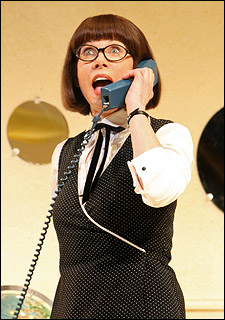
She did Sweeney Todd in Washington, DC, and Paul Rudnick's Regrets Only Off-Broadway. But the resuscitated 1960s French farce Boeing-Boeing — which recently opened to laudatory reviews — is her first turn on Broadway since 1991, when she played a part in the immortal flop musical Nick & Nora. And it's her first flat-out farce since Neil Simon's Rumors, one of two Broadway plays that won her a Tony Award. (The other was The Real Thing.) The show is about Bernard, a bachelor who's stringing along three different "air hostesses," each on a different flight schedule. Baranski is the jaded French maid, Berthe, the only woman on Bernard's premises who knows the rules of the game. Most actresses start out their careers playing the maid, but Baranski seems quite content to spend the prime of her career cleaning house.
Playbill.com: What attracted you to this project? Did you see the play when it was in London?
Christine Baranski: I did. I was just finishing up filming "Mamma Mia!" It was my second-to-last night in London. My manager called up and said [the producers] were wanting to do an American production and were interested in me for it. Meryl Streep and I went and we sat there laughing all evening. We thought it was great fun, and in fact we were seeing the final replacement cast. I thought the production values were stunning. I could see what a well-crafted play it was.
Playbill.com: Were you surprised by any of director Matthew Warchus' choices? He seems to have found a lot of ways to freshen the period material up.
CB: Yes, he needed to make it appealing to an American audiences. When I saw it, the male leads were British. The hick character was a Welshman. The maid was played as a cockney. When I met with Matthew, I said, "Gosh, this is an apartment in Paris. The maid came with the apartment. How could she not be a Frenchwoman? I really made the case that at least one person on the stage should be French. I thought my character had such a French feeling to her with her innate sense of superiority and attitude. In the play, the stewardesses are American, Italian and German. They had toyed around with making one of stewardesses British or French. I simply didn't hear this role with an American accent. I didn't know what an American would be doing working in a house in Paris.
Playbill.com: So with your French accent, you completed the array of nationalities on the stage.
CB: Yes. And quite honestly, part of the delight of this play is in all the broad, politically incorrect takes on various nationalities. Everything's in stereotypes and quotation marks.
 |
||
| Christine Baranski in Boeing-Boeing |
||
| photo by Joan Marcus |
CB: It is. You create a character and then you lift it and put it in quotation marks. It's fun for the audiences, particularly with our funny relationship with the French. Playbill.com: Berthe is distinctively dressed in a black bob, glasses, a white blouse and black tights. Was that costuming also your idea?
CB: Yes. I wanted her to have a curious, austere chic. The stewardesses are in a Technicolor movie, and I'm in a black-and-white movie. I'm like something out of "The Third Man." She's like a black-and-white pencil drawing. But if you look at her, you go, "Actually, she's either a Plain Jane or she's a chic-looking French woman.
Playbill.com: One of the other fun parts of doing the role must be that you get to scream at the top of your lungs, not once but three times.
CB: Well, thank you for noticing it is three times. I thought once would be enough. I only screamed once in the rehearsal hall. But it's such a shocking moment that it seemed like one scream wouldn't do. So yes, I do three. Last night, I think I did four.
Playbill.com: I guess you take the temperature of the audience.
CB: (Laughs) Exactly.
Playbill.com: You and the cast perform the show without mikes. That's unusual these days.
CB: It was an artistic decision to have the audience hear what the actors actually sound like without mikes. One of the problems with shows these days is they are so miked you don't know who's singing or speaking. The tenor of the performance is being controlled by the sound man. We need to play this at a certain energy pitch, and the fact that we have to vocally push it out adds to that pop-y feeling the piece needs to have. That said, it's extremely demanding vocally, and I do vocal warm-ups every night. I don't do as much shouting as my colleagues, but I do have to pop my voice out a great deal because of the French accent, which can be inscrutable. The emphasis is on different syllables. Really, I'm spitting words out. Honestly, when I get off the phone with you, I'll be on the floor warming up.



Evan-Zimmerman-for-MurphyMade.jpg)






